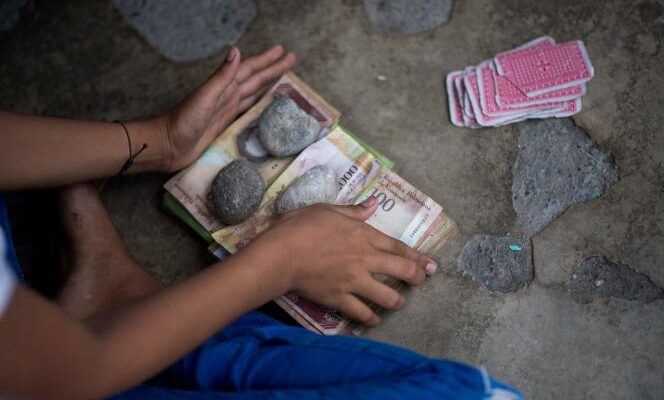Venezuelan currency lost six zeros, Friday 1er October, at midnight. The monetary reform initiated by Nicolas Maduro to counter the effects of hyperinflation and supposed to revitalize the economy is the third that the country has known since 2008. The bolivar – which gave way to the “strong bolivar”, then to the “sovereign bolivar” “And now to the” digital bolivar “- lost, in all, 14 zeros. The country is in recession for the seventh year.
On a sidewalk in Bogota, Colombia, a little girl plays at the merchant with real banknotes. Her father, José, offers passers-by handbags made from woven banknotes. “The bolivar hasn’t been worth anything for a long time, said the man with a sigh. In Venezuela, everything is paid for in dollars now. ” Like five million of his compatriots, José came to try his luck as a street vendor in Colombia. He sends “Between 5 dollars and 10 dollars [entre 4,30 euros et 8,60 euros] per month “ to his old parents. In Venezuela, the minimum wage barely exceeds $ 2, and 94.6% of the population lives below the monetary poverty line, according to a survey released Thursday, September 30.
The digital bolivar that went into service on Friday morning is not a new currency. “It will be worth neither more nor less than the current bolivar, recalled, Monday, September 27, the vice-president, Delcy Rodriguez. It is only the monetary scale that changes to facilitate transactions. “
A “cosmetic” measure
It is true that bills in billions of bolivars complicated life. The bus ticket in Caracas, which was worth 1 million bolivars, or 0.25 cents of a dollar, is now worth 1 bolivar. As its name does not indicate, the digital bolivar exists in the form of banknotes and coins.
The new denominations of 5, 10, 20, 100 and 500 bolivars all bear the effigy of Simon Bolivar (1783-1830), hero of Latin American independence and of the Bolivarian Republic set up by Hugo Chavez (1954- 2013), between 1999 and 2013. Mme Rodriguez has signaled that the old and new banknotes will coexist for a time, without specifying a timeline for the withdrawal of the old banknotes. There are doubts that the central bank will succeed in supplying the Venezuelan economy with notes and coins.
“We got used to living without cash”, recalls José, who was an electrical engineer in his country. Since hyperinflation devoured money, money has disappeared from wallets. In Caracas, a coffee at the counter or a tip can be paid by credit card. In the stores, now well stocked, prices are displayed in bolivars and dollars.
You have 49.26% of this article to read. The rest is for subscribers only.
